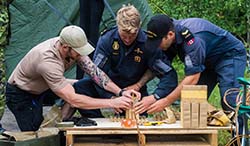Operation OPEN SPIRIT
The Canadian Armed Forces (CAF) have taken part in Operation OPEN SPIRIT since 2014, with an aim of clearing explosive remnants of war in the Baltic Sea. The three Baltic nations—Latvia, Lithuania, and Estonia—take turns hosting the operation. A number of other countries take part. The CAF sends a task force on behalf of Canada.
Nations conduct this operation in the spirit of Partnership for Peace (PfP). This is a program where individual Euro-Atlantic partner countries work with NATO on practical projects. It allows partners to build an individual relationship with NATO. The countries choose their own priorities for cooperation.
How many people are deployed
A team of 15 to 20 clearance divers and support personnel from the Royal Canadian Navy take part in this operation.
What are they doing
During the operation, the dive team works with international partners to scan the seabed in designated areas and search for mine-like objects in the water. Once they confirm that an object is an explosive remnant of war, they or another partner will countermine it. This means that they conduct a controlled detonation.
After they thoroughly search an area, they can declare that it is clear of dangerous mines. This reduces the risk for the shipping and fisheries industry in the Baltic Sea.
Social Media
Canadian Joint
Operations Command
News
- The art of minesweeping: Operation OPEN SPIRIT 2018
Link to External Site / May 31, 2018
History and context of the operation
The Baltic Sea saw heavy fighting during World War I and World War II. This included air bombardment, naval gunfire support, mine-laying, and submarine warfare. As a result, unexploded ordnance (UXO) remains in some areas of the Baltic Sea. UXO are munitions which have been fired or deployed but have failed to explode. This presents a potential safety hazard in the area.
Past deployments
CAF members have contributed to this operation since 2014. Working alongside partners, they achieved the following:
- in 2014, they countermined two ordnance in Latvia
- in 2015, they identified 15 mines in Estonia
- in 2016, they countermined one ordnance in Lithuania
- in 2017, they countermined one ordnance in Latvia
- in 2018, they countermined four ordnance in Estonia
- in 2024, they countermined two ordnance in Estonia
